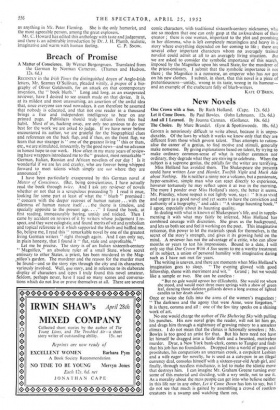Breach of Promise
RECENTLY in the Irish Times the distinguished doyen of Anglo-Irish letters, Mr. Seamus O'Sullivan, pleaded wittily, a propos of a bio- graphy of Oliver Goldsmith, for an attack on that contemporary invention, the " book blurb." Long and long, as an exasperated reviewer, have I desired to see assault made on that device. It is, at its mildest and most unassuming, an assertion of the awful idea that, since everyone can read nowadays, it can therefore be assumed that nobody is educated, and that not one reader in a thousand brings a free and independent intelligence to bear on any printed page. Publishers should truly refrain from this bad habit. Most of us, hacking away, are only too anxious to do our best for the work we are asked to judge. If we have never before encountered its author, we are grateful for the biographical clues and references on the back flap, and if then, on the front flap, we learn that our stranger is " one of the greatest living " this or thats, etc., we are stimulated, innocently, by the good news—and we advance in honest hope to our work. How often in my many years of review- ing have wrappers introduced me to the" greatest, most remarkable " German, Italian, Russian and African novelists of our day ! Is it wonderful if we are lax and cranky, who are forever being whipped forward to meet talents which simply are not where they are announced ?
I have been particularly exasperated by this German novel A Matter of Conscience. (But, being conscientious, I have actually read the book through twice. And I ask any reviewer of novels whether or not that is a scrupulous proceeding ?) I read it once, looking for some part at least of what the " blurb " promised : " concern with the deeper recesses of human nature ... with the dilemma of human nature itself . . . the theme is timeless, and specially apposite to the present age. . . ." I found the book, at first reading, immeasurably boring, untidy and tricked. Then I came by accident on reviews of it by writers whose judgement I re- spect, and they were eulogistic, and found merits of wit and symbolism and topical reference in it which supported the blurb and baffled me. So, believe me, I read this " remarkable novel by one of the greatest living German writers " right through again. And I can only say, in plain honesty, that I found it " flat, stale and unprofitable."
Let me be precise. The story is of an Italian sixteenth-century " Magnifico," an absolute ruler of a small State, whose secret emissary to other States, a priest, has been murdered in the Mag- nifico's garden. The murderer and the reason for the murder must be found—and so the story rips through the city and its characters, variously involved. Well, qua story, and in reference to its elaborate display of characters and types I truly found this novel amateur. Seldom, perhaps never, have I read so many scenes and conversa- tions which do not live or prove themselves at all. There are several comic characters, with traditional sixteenth-century nicknames, who are so modern that one can only gasp at the awkwardness of their creator ; there is one woman, important to the plot and promising in her dilemma, who is left completely meaningless and heavy in a story where everything depended on her coming to life ; there are several other important characters whom no averagely trained novelist could admit at all to an averagely living situation. But we-are asked to consider the symbolic importance of this search, imposed by the Magnifico upon his small State, for the murderer of the priest-emissary. I submit that the symbolic importance is not there ; the Magnifico is a nonsense, an emperor who has not got on his new clothes. I submit, in short, that this novel is a piece of pretentiousness—untidy, wrong in its taste, wrong in its humour— and an example of the exuberant folly of blurb-writers.
KATE 0 'BFUEN.


































 Previous page
Previous page